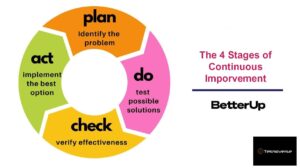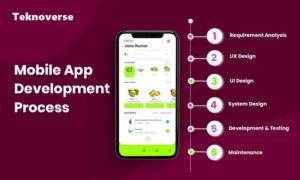In the rapidly evolving world of technology, selecting the right android app development company in the USA, is pivotal for success. This article explores the intricacies of choosing a development partner, highlighting the expertise required, and why it matters for your business.
Create Success in Android App Development Explained
Expertise in the Android Ecosystem:
Navigating the world of Android is like strolling through a busy neighborhood, and it takes a special skill set. Our Teknoverse team, like friendly guides, knows their way around. They’ve got a lot of know-how, making sure your app fits right in with all kinds of devices. Think of it as creating a buddy for your users that blends in effortlessly. Teknoverse doesn’t just make apps; we make digital pals that easily jive with different Android gadgets, ensuring your users have a breezy and enjoyable experience every time.
Tailored Solutions for Your Business:
Think of us as your digital design companions, based right here in the USA. We’re not just about making apps; we’re in the business of creating a unique, tailored experience for your brand. Imagine sitting down with friends who genuinely want to understand your business – that’s us.
Our journey kicks off with a chat, a virtual coffee if you will. We want to know the ins and outs of your business – the quirks that make it special, the challenges you face, and the dreams you’re chasing. It’s not a transaction; it’s a partnership.
From there, our team becomes your personal artisans. We’re not just coding; we’re sculpting a digital masterpiece that mirrors your brand. Every button, every feature – it’s all carefully crafted to not just meet, but exceed your expectations. We’re not just building an app; we’re weaving a story that aligns with your brand’s narrative.
But our commitment doesn’t end with the launch. We’re here for the long haul. As your business grows and evolves, so does your app. Consider us your tech support, always ready to ensure your digital sidekick stays in sync with your journey.
Choosing us means more than getting an app; it’s gaining a reliable companion on your digital adventure. We’re all about partnership, creativity, and adapting to your unique needs. Your business is one-of-a-kind, and we’re here to ensure your app reflects that uniqueness every step of the way.
Development Journey Unveiled
Strategic Planning:
Imagine our strategic planning phase as sitting down with a trusted friend to sketch out your dream. Before we even touch a keyboard, we become your creative partners. Together, we chat about your vision, dreams, and what makes your app special – it’s more than just a project; it’s a shared journey.
In this detailed planning stage, we roll up our sleeves and delve deep into your aspirations. We’re not just checking off boxes; we’re crafting a roadmap that captures the soul of your app. Think of it as painting a picture where every brushstroke reflects your unique goals.
Throughout this process, we’re not just planners; we’re problem-solvers. We anticipate hiccups, ensuring a smooth ride for your app’s development. It’s a bit like mapping out a road trip with a trusted friend who knows all the shortcuts and scenic routes.
So, when we talk about strategic planning, we mean building a plan that’s as unique as your app. It’s a collaborative effort, a shared vision, and a promise to turn your ideas into a well-crafted strategy. This isn’t just about coding; it’s about creating something meaningful and ensuring that your app journey is not just successful but also a reflection of your digital aspirations.
Agile Development Methodology:
Imagine our development process as a dance where adaptability takes center stage – that’s the essence of Agile Methodology for us. Think of it as a lively conversation, a back-and-forth rhythm that keeps your project in sync with your evolving needs.
In this dance, we don’t just follow a rigid script; we move in cycles, refining our steps with each iteration. It’s like learning new dance moves – we try, adjust, and refine until every step feels just right. Your project isn’t a set routine; it’s a collaborative dance where we listen to your cues and adjust our moves accordingly.
Continuous feedback is the music playing in the background. It’s not just about us performing; it’s a dialogue. Your insights guide the choreography, making sure every development step resonates with your vision. It’s like having a dance partner who not only appreciates the performance but actively shapes it.
So, when we talk about Agile Development, it’s not just a technical approach; it’s a dance of collaboration, flexibility, and constant refinement. Your project isn’t just a set of code; it’s a living performance that adapts and evolves, ensuring that the end result is not just what you need but what feels right for your unique journey.
User Experience the Design Matters
Intuitive UI/UX:
Think of our UI/UX experts as artists designing a digital masterpiece with your users in mind. It’s not just about making things look good; it’s about creating an experience that feels like a well-designed home for your users.
We’re not just picking colors and placing buttons randomly – every design element is carefully chosen to make your app not only visually appealing but also user-friendly. Imagine it as creating a comfortable living space where everything has a purpose and is within easy reach.
Our focus on seamless navigation is like crafting a smooth journey through a city. We want users to feel like they’re on a well-marked path, effortlessly finding what they need without getting lost. It’s about making your app a place where users can comfortably explore, knowing they won’t hit any dead ends.
The end goal is more than just a pretty interface; it’s about making users feel at home in your app. We want them to enjoy every interaction, as if they’re navigating a familiar and welcoming space. It’s about creating a connection between your users and the digital environment, making sure they not only use your app but also genuinely enjoy the experience.
Accessibility Across Devices:
Think of our developers as digital tailors, custom-fitting your app for every Android device out there. We don’t just create a generic look; we design a wardrobe that suits each device’s unique style and size. It’s like making sure your app is not just a good fit but looks fantastic, whether it’s on a small phone or a big tablet.
We’re not just about responsiveness; we want your app to feel like it’s made just for each user, regardless of the device they have. It’s a bit like creating a personalized playlist, where every note is carefully chosen to match the device’s capabilities.
Navigating the diverse world of Android devices is like conducting an orchestra for us. Each device has its own tune, and our developers ensure that your app’s melody sounds great on every Android instrument. We’re not just accommodating differences; we’re celebrating them, making sure that every user, no matter their device, has a delightful and tailored experience.
By optimizing for accessibility across the Android spectrum, we’re not just coding; we’re building connections. It’s about making your app a welcoming space for everyone, ensuring that each user, with any device in hand, feels like they’ve found their perfect fit in the digital world.
Flawless Performance Quality Assurance
Rigorous Testing Protocols:
In our USA-based Android app development journey, testing is like giving your app a thorough health check-up. We know bugs and glitches are the party crashers that can spoil the fun, and we’re on a mission to make sure your app is nothing short of stellar.
Our testing is not just a routine; it’s like putting each line of code through a magnifying glass, making sure it’s up to the mark and then some. We’re not just looking for an app that works; we want it to work seamlessly, like a well-rehearsed dance, ensuring your users have a frustration-free experience.
Think of our testing as a safety net – one that catches any hiccups before your users even notice. We’re not just delivering an app; we’re handing over a reliable, polished gem that reflects the care and attention we put into every detail.
Our commitment to flawless performance is because we know your app’s reputation is like a digital handshake – it has to be firm and trustworthy. We get that users are discerning, and a glitch-free experience is the secret sauce for gaining their trust and making your app the top pick in the digital crowd.
So, when we talk about rigorous testing, it’s not just a technicality; it’s a promise. A promise to deliver an app that not only meets but exceeds your expectations and those of your users. It’s about creating not just an app but a digital companion that shines for its quality and reliability.
Continuous Improvement:
In the ever-changing world of tech, we don’t just stop at creating your app – we see it as an ongoing journey of improvement. It’s like tending to a garden, where we not only plant the seeds but also nurture and grow them over time.
User feedback is our guiding light. We don’t just hear it; we actively seek it out, treating every user’s experience as a valuable story that helps us refine and enhance your app. It’s like having a continuous chat with your users, ensuring their insights shape the evolving story of your app.
Staying ahead in the tech game is more than just keeping up; it’s about staying a step ahead. We keep our eyes peeled for industry updates, making sure your app not only keeps pace with the latest trends but also leads the way. It’s like having a tech-savvy friend who always keeps you in the loop.
Our goal is to create more than just a digital tool; we’re building a companion that evolves with the changing tech landscape. We want your app not only to meet current needs but also to be a lasting asset that grows and adapts to fulfill future expectations, providing ongoing value and joy to its users.
So, when we talk about continuous improvement, it’s not a phase; it’s a commitment. A commitment to ensuring your app doesn’t just exist but thrives, adapting and surprising users with fresh ideas in this ever-evolving tech world. It’s about crafting an app that not only meets expectations but continues to exceed them, offering enduring value and innovation to the people who use it.
Showcasing the Android App Development Company in USA
Client Success Stories:
A captivating journey through the heartwarming success stories of our clients, where dreams turned into reality with the help of our Android app solutions. These aren’t just stories; they’re vibrant chapters that unfold the impact of collaboration and innovation.
Picture a startup finding its feet, an established business breaking new ground, or a visionary entrepreneur making waves – each story is a testament to the human side of our Android app development. It’s not just about lines of code; it’s about turning aspirations into achievements, bringing smiles to the faces of our clients.
As you delve into these narratives, you won’t just read about technical feats but also witness the personal triumphs and challenges overcome. Our collaborative spirit, innovative thinking, and attention to detail shine through, creating success stories that resonate not just in boardrooms but in the hearts of those who dared to dream.
These aren’t your typical case studies; they’re living tales of businesses and individuals thriving in the digital landscape. From streamlining operations to reaching new horizons, our Android app solutions have played a pivotal role in these stories of growth and accomplishment. So, come join us in celebrating the human side of tech success, where every line of code has contributed to making dreams a reality.
Industry Recognition:
Our journey as a go-to Android app development company in the USA is not just about coding; it’s about building meaningful connections and delivering results that resonate. The recognition we’ve earned in the industry is more than just a pat on the back; it’s a testament to the trust our clients place in us and the impact we’ve had on their success stories.
These acknowledgments aren’t just fancy titles; they’re the result of late-night brainstorming sessions, countless cups of coffee, and a shared commitment to innovation. We’ve been recognized not just for our technical prowess but for the human touch we bring to every project.
Take a stroll through the moments that brought us recognition – it’s not just about awards; it’s about the stories of collaboration, overcoming challenges, and celebrating victories. Our success is intertwined with the success of our clients, and each recognition is a shared achievement.
What makes us stand out isn’t just the lines of code we write; it’s the impact we make on businesses and individuals. Our industry recognition is a celebration of the relationships we’ve built, the challenges we’ve conquered, and the innovative solutions we’ve delivered. It’s a journey that goes beyond titles and trophies; it’s a journey of trust, partnership, and collective success.
So, when we talk about industry recognition, it’s not just about accolades; it’s a narrative of people, passion, and the unwavering commitment to excellence that defines our journey in the dynamic realm of Android app development.
FAQs
How long does the app development process take?
Our timeline varies based on project complexity. However, we prioritize efficiency without compromising quality, ensuring timely delivery.
What sets your company apart from other Android app developers?
Our commitment to tailored solutions, user-centric design, and continuous improvement distinguishes us. We prioritize client success and lasting partnerships.
Can you handle both small startups and large enterprises?
Absolutely. Our flexible approach caters to businesses of all sizes. We’ve successfully collaborated with startups and Fortune 500 companies, adapting our strategies accordingly.
Do you provide post-launch support?
Yes, our services extend beyond launch. We offer post-launch support, ensuring your app remains optimized and updated in the ever-evolving digital landscape.
How do you ensure the security of the developed apps?
Security is paramount. Our development process includes robust measures to safeguard your app and user data, ensuring a secure user experience.
Is it possible to integrate third-party APIs into the app?
Certainly. Our developers are adept at integrating third-party APIs, and enhancing the functionality and features of your app.




















